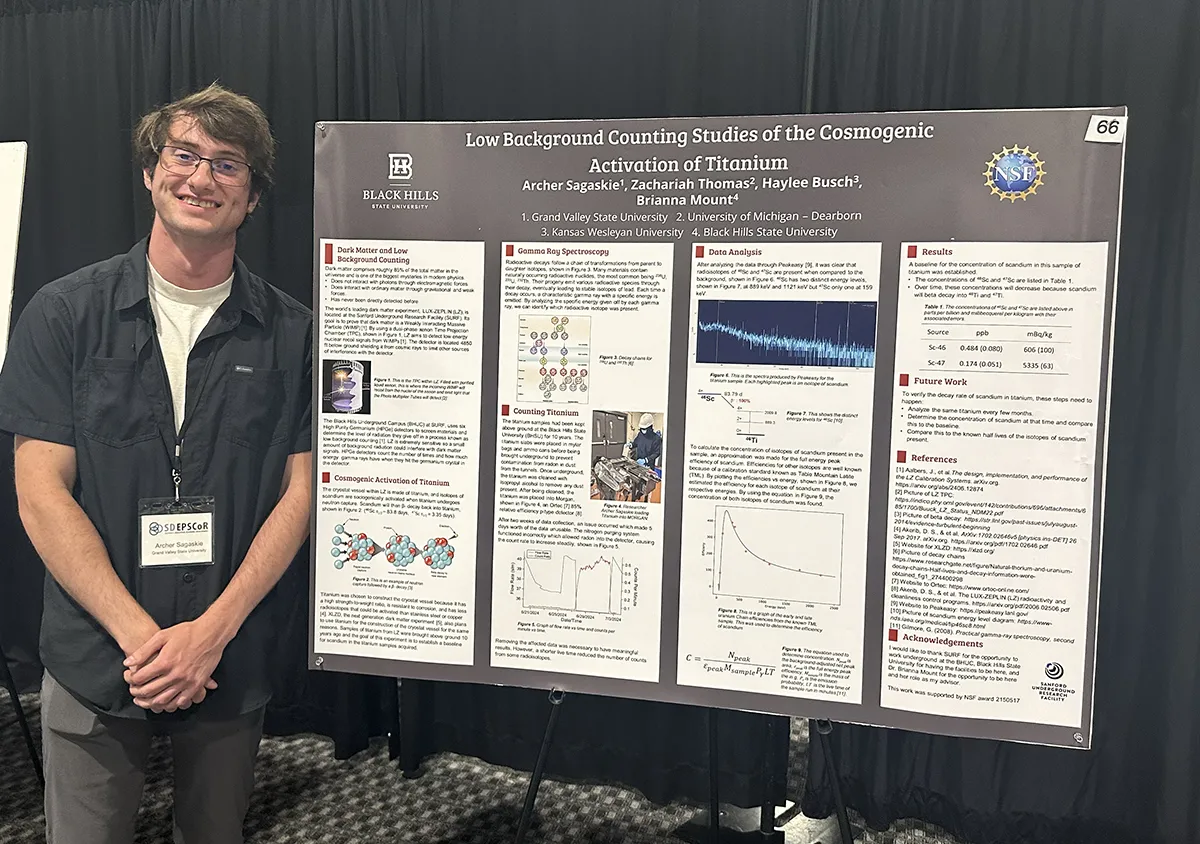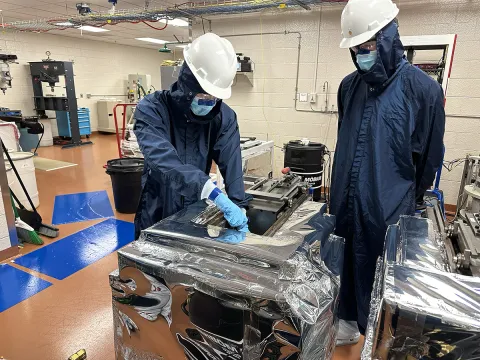Black Hills State University (BHSU) Inspires Future Physicists

Article: Mike Ray at SURF. Pictured: Archer Sagaskie with his research poster at the SD EPSCoR 11th Annual Research Symposium held July 31 and August 1 in Sioux Falls, SD.
Each summer, college students take part in the Research Experience for Undergraduates program at Black Hills State University and the Sanford Underground Research Facility.
Archer Sagaskie is a student of physics at Grand Valley State University in Michigan. During his classroom studies, he had never run the high-end scientific equipment needed to detect low-levels of background radiation, nor had he ever had a chance to troubleshoot equipment malfunctions in everyday work. Furthermore, Sagaskie had never experienced descending a mile below ground to work at a world-class laboratory where cutting-edge research takes place.
The summer of 2024 changed all of that.
“The Black Hills are an amazing place and this summer of research at Black Hills State and the Sanford Underground Research Facility was an amazing experience,” Sagaskie said.

Sagaskie took part in the Research Experience for Undergraduates (REU) program at Black Hills State University (BHSU) and the Sanford Underground Research Facility (SURF). The National Science Foundation-funded program immerses college students in real-world research in an effort to show them what a career in STEM actually entails.
Inspiring the students of today with real-world research opportunities is part of building the STEM workforce of tomorrow. “This summer really gave me a chance to see what a career in experimental or theoretical physics would be like, and it definitely gave me lots of knowledge to take back to the classroom,” Sagaskie said.
Dr. Brianna Mount, an associate professor of physics at BHSU, runs the REU program for her department and leads the operation of the Black Hills State Underground Campus at SURF. Part of her work, and the REU program she runs, involves measuring minuscule amounts of radiation that are often found in everyday parts, from the same kinds of nuts and bolts that hold your car together—to electrical wires—to copper pipes.
In almost all applications the tiny amounts of radiation in everyday objects are no issue—but if your job is to build a super sensitive physics experiment, these tiny amounts can make a big difference in your end results.
At SURF, Mount and her students run and maintain equipment that can detect low amounts of radiation inside the components used to build experiments like the world’s leading dark matter detector, LUX ZEPLIN (LZ). The effort involves testing various parts to determine which types have the lowest amount of radiation. The summer REU not only involved this kind of testing, but also building, running, maintaining and programming the complex scientific instruments needed to complete the job.
“Dr. Mount was a real champion for the REU students, she kept us all working together and learning while we were engaged in the work and various projects,” said Sagaskie. “It was an incredible summer of research balanced with plenty of time having fun while exploring the Black Hills.”
“These summer research experiences are so valuable for the future of STEM. They are also a vehicle for many students who attend smaller universities to gain valuable research experience that isn’t always available at their school. We’re excited for the ongoing work of this program in the coming years,” said Deb Wolf Director of Outreach and Culture at SURF.
Black Hills State’s REU at SURF will continue in the summer of 2025 with the potential for some expanded opportunities for students. Mount recently received a grant from US Department of Energy, totaling nearly $1 million, to continue her work assisting LZ and conducting low-background radioactivity testing for future experiments at SURF.
 National Science Foundation RII Track-1 Project:Expanding Research, Education and Innovation in South Dakota
National Science Foundation RII Track-1 Project:Expanding Research, Education and Innovation in South Dakota